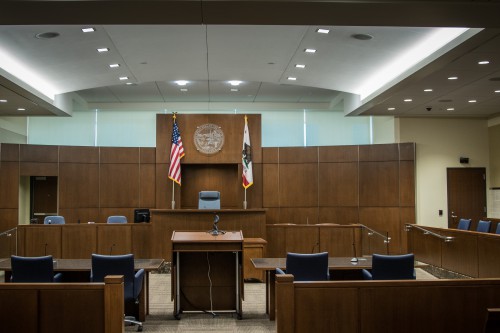
 By Teja Dusanapudi
By Teja Dusanapudi
In a decisive move following expert testimony this Thursday afternoon, Judge David Reed moved the case of Cody Grimes to arraignment, after finding reasonable evidence to believe that Mr. Grimes committed six of the seven crimes with which he had been charged, including child abuse and possession of a firearm as an ex-felon, while dropping a charge related to the planting of marijuana.
The preliminary exam, which began Monday, resumed Thursday with the People calling Deputy Sheriff Gary Richter to the stand, a deputy for 11 years and a member of the Yolo Narcotic Enforcement Team (YONET) for seven years.
Deputy Richter described his experience with narcotics at high, mid, and street levels, especially in relation to marijuana and butane honey oil (BHO), with which he claimed experience regarding the sale and trade of those products, at which point the People requested the Court consider him an expert.
The People then moved to question Dep. Richter on the events that occurred on April 14 of 2016, to which Mr. Richter testified that he had been called in by officers who, on a probation and child endangerment search, had found butane honey oil and marijuana on the premises of a property that belonged to Mr. Grimes.
Upon arrival and inspection of the property, Sheriff Richter testified that he had found, inside the house, 25 shotgun rounds along with a loaded shotgun unsecured in the master bedroom, multiple mason jars containing marijuana buds, and approximately 153 grams of BHO. Outside of the house, in a Conex (container express) box, Dep. Richter found a BHO oil manufacturing lab, manufactured by the company CaliExtractions.
The People then asked Dep. Richter to teach the court the basics of different butane honey oil manufacturing systems, and Rickter began by describing the two main varieties, an open-loop system and a closed-loop system.
The People verified with Richter that Mr. Grimes was using a closed-loop system, in addition to evidence of an open-loop system being on the property although not confirmed to be used – with the 
latter possibly releasing butane across the grounds, which the People noted to be a serious hazard, and Richter agreed with that assessment.
Deputy Richter also testified that, aside from Mr. Grimes who was outside of the house upon the arrival of the officers, the only other inhabitants of the property were Mr. Grimes’ children, aged six and nine, who were inside the house with the unsecured firearm.
In a later discussion with officers on the scene, Richter learned that Mr. Grimes admitted to providing marijuana to his aunt and two dispensaries, one in Stockton and one in Sacramento, with the Stockton dispensary paying him in cash. Mr. Grimes also informed the officers of his involvement in a marijuana cooperative.
The People ended by pointing out the illegal nature of Mr. Grimes’ actions, as he did not have a contract with any dispensary that would allow him to legally profit from the sale of marijuana.
Joseph M. Tully, serving as the defense attorney for Mr. Grimes, began his cross-examination with noting that the looped systems Mr. Richter testified to having found were also intended by CaliExtractions to extract other essential oils, not simply butane honey oil.
Mr. Tully further asked Richter if, in his inspection of the extraction devices, he found any defects that would have let butane leak out, or otherwise cause any other accident that might endanger the children of Mr. Grimes, to which the deputy responded in the negative.
When pressed, Dep. Richter also conceded that he was not aware if the open loop system was in use at any time, or if the door of the Conex box containing the system was open during its use.
Bringing up the subject of Mr. Grimes’ illegal sales, Mr. Tully clarified that while the lack of a contract pushed Mr. Grimes’ transactions out of the realm of legality, only the actual profit itself made Mr. Grimes actions illegal, to which Richter replied in the positive.
When asked by Mr. Tully if he knew if any of the recipients of Mr. Grimes’ marijuana had medical licenses that would allow for legal dealings in terms of the substances provided, Richter admitted that he was not informed and did not know.
Dep. Richter also was not aware of how long the shotgun had been left unsecured or who had most recently interacted with the shotgun.
In his closing argument, Mr. Tully asserted that there were too many undefined variables in the case that the prosecution was manipulating with paranoid speculations, reiterating that the many facets of the property the prosecution termed as dangerous or illegal (the butane honey oil manufacturer, the unsecured firearm, aggressive dogs kept in chains) simply only had the potential to be dangerous, and as such should not be considered seriously in court.
In response, the People brought up Mr. Grimes’ prior conviction of dog fighting and the circumstantial evidence that pointed to Mr. Grimes’ continued involvement in dog fighting as but one of the dangers and illegal actions taking place on the property. The People also stated that, in every case, an unsecured shotgun and possible butane leak would always be dangerous simply because of their potential to endanger the inhabitants of the property, especially the children.
Ultimately, Judge Reed ruled that he found reasonable evidence that Mr. Grimes committed the crimes of manufacturing controlled substances, child abuse, possession of firearms as an ex-felon, possession of ammunition, possession of marijuana for sale, and training dogs to fight, and he set the arraignment for later in December.
